The Naked Society
A Series on Past and Present Nudist Cultures
by Carlson Wade
Part II
GREEK NUDISM IN ATHLETICS
Modern athletics call for a minimum of clothing. It seems odd that the very part of the body that is covered is one that is made more emphatic. The more we seek to conceal, the more we draw attention to it. The Greeks emphasized the values of developing a healthy mind in a healthy body this meant that thoughts were to be lofty, spiritual, beautiful and free from shame or inhibition. Nowhere could this be so successful as in gymnastics.
In Athens, during the time of Emperor Augustus, a magnificent gymnasium was built; called the ephebeion, it was the exercise ground of the ephebi, that is, young boys declared of full age and independent citizens at the age of 18. This gymnasium had its colonnades, baths, halls and spaces graced by naked philosophers, rhetoricians, poets and friends. With the gymnasium was generally combined the palaestra, the chief arena for bodily exercises and games of the boys. Here, nudity was a way of life among the young athletes.
Manly Beauty
It need hardly be emphasized that all the spaces in the huge gymnasia were adorned with works of art of every kind, with altars and statues of Hermes, Heracles and especially of Eros, but also of the Muses and other divinities. Thus to the beauty of the bodies of boys, youths and men, most harmoniously developed by regular bodily exercises, was added the daily sight of numerous marvels of art.
It is easy to understand how and why the Greeks developed into the most beauty-loving people that ever walked on earth. One can also understand how it was that no gymnasium or palaestra of the Greeks was ever without an altar or statue of Eros. The daily sight of the highest manly beauty served to inspire them to achieve new heights in mental and physical development.
Johann Goethe, t h e German author (1749-1832), in his Italian Journey once described an athletic contest he had seen in the arena at Verona: “The most beautiful attitudes, worth imitation in marble, appear therein. As they are merely well-grown, sturdy young people in short, scanty, white clothes, the sides are distinguished only by a colored badge. Especially beautiful is the position into which the striker falls while he runs down from the slanting surface and lifts his arm to strike the ball.”
Let anyone now pause to visualize an Athenian or Spartan palaestra, full of the joyous, boyish laughter of well-muscled youths bustling about in the naked splendor of their supple bronzed limbs, the whole beneath the delightful blue of the Greek sky, and he must admit that it was there that earthly beauty celebrated its highest triumphs.
Women Taboo
The Greeks kept the sexes apart since they well understood that disturbing influences might hinder the development of the aesthetic and cultural. The Greeks kept their gymnasia free from women; that is, no female creature might ever set her foot in any of these places intended for the education of the male even at the popular festivals of the great national games, women were excluded as spectators.
Pausanias in his Greek Descriptions (Vol. 6, 7) says it was the custom to throw those women down from the rock Typaeum at Olympia, if they were caught in the act of stealing in as spectators at the Olympic games, or even those who, on the days forbidden them, had crossed the river Alpheus, which separated the site of the festival from the rest of the ground.
On one occasion this was neglected. The mother of Peisirrhodus had stolen in so as to be present, with a mother’s joy easy to understand, at the hoped-for victory of her son. To avoid the danger of discovery she had disguised herself as a trainer; but when trying to leap over the barrier that shut off the trainers from the arena in order to congratulate her son on his victory, her scanty garments exposed her person. Considering that her family had produced several Olympic victors, she was not punished. But to avoid similar incidents in the future, it was ordered that all trainers go naked.
Strange Rule
While the prohibition which excluded women from viewing naked athletes did not prevail with equal strictness throughout Greece, at least Bockh on Pindar, Pythia (Vol. 9, p. 328), makes it probable that in the contests of the African-Greek colony of Cy-rene, women were permitted to watch the naked youths in their athletic prowess.
According to Pausanias, single girls could watch the contestants at Olympia. Married women were prohibited. Classical scholars have racked their brains to discover why the right to look on at their contests of naked boys and youths was permitted to single girls but not to married women.
This problem seems simple if we recall that the Greeks felt the greatest enjoyment of beauty, more than any people that ever existed. They desired at their national festivals to surround themselves only with beauty, hence they allowed young girls to look on while they made the married women remain at home.
The Dorians and especially Sparta were freer from prejudice in this respect. Plato (Laws, Vol. 7, p. 804) urges that young males and young females carry on gymnastic exercises without discrimination as between the sexes. His demand was carried out among the non-Dorian states, at least by the inhabitants of Chios, where, according to the express testimony of Athenaeus (Vol. 13, p. 566), no person considered it offensive to watch the running and racing contests of young naked boys and girls in the gymnasia.

In Sparta, girls and young men carried out gymnastic exercises together; it is probable that on some occasions they wore a little scant covering, but this is debatable when we understand the wholesome attitude toward nudity. This is the opinion of Roman authors when they speak of the nuda palaestra, the naked wrestling place of Spartan youths.
This explains how the expression, “to behave in Dorian fashion,” became synonymous with “to strip oneself” which would explain also that the athletes wore clothes in public but were in a state of raw nature in certain places. In the Spartan gymnasia there was one principle: “Undress and practice gymnastics together, or get away.” This excluded the idly gaping spectators who could be offensive.
Surprisingly enough, this is the same principle of modern nudism.
Everyone must be in o state of nature or be gone!
In spite of nudity, there was regard to be held for decency and modesty in the gymnasia. This is clear from a passage in Aristophanes, Clouds, 973: “And it behooved the boys, while sitting in the school of the gymnastic-master, to cover the thigh, so that they might exhibit nothing indecent to strangers; and then again, after rising from the ground, to smooth down the sand and to take care not to leave an impression of the person for their lovers. And no boy in those days anointed himself below the navel so that the first tender down bloomed on his privates as it were on fresh apples.”
Love of Beauty
The Greeks loved beauty and the glories of manly perfection; they made awards for the most masculine and attractive men based upon health and superb vigor. At the festival of the Panathencea, young men were select-ed from different tribes according to their masculine beauty and dexterity for the torch race.
There is the legend of King Candaules who so loved the beauty of his wife, boasted about her and had to display her naked to his friends. A favorite friend of the family, Gyges, resisted, feeling that such a public display was shameful. This, again, shows that the Greeks had a high regard for nudity as Such not as an exaggeration.
Flute players appeared at private festivals either naked or wearing a sparse garment. Anaxarchus, the favorite of Alexander the Great, was fond of having his wine poured out for him by a beautiful naked girl.
The Stoic philosopher, Persaeus, the confidant of King Antigcnus, relates of a banquet given by the king at which the conversation was at first very serious. “But as the drinking increased among other amusements, Thessalian dancers entered the dining-hall and danced stark naked except for a girdle; this pleased the guests so exceedingly that, enchanted, they expressed their approval, sprang up from their seats and declared the king happy in that he could always enjoy such delight for his eyes.”

At the wedding of his daughter Hippolochus tells us, “Naked female acrobats also appeared, who with naked swords performed dangerous tricks and spat fire.”
Numerous vase paintings, on which such artists are represented either quite naked or only wearing an apron, prove that such exhibitions were frequent; in the Hellenistic period, they enjoyed general popularity.
That, considering the freedom from prejudice of the attitude of the Greeks toward nakedness, the naked were welcomed in ceremonies concerning the worship of the gods, is self-intelligible. “Nudism to these people was not exposure as we erroneously regard it today. It was a healthful way to call attention to the values of developing a superior body and a mature, neurosis-free way of life.
{To be continued)
The American Sunbather
ISSUE: Number 2, April 1967
Publisher: The American Sunbather and Naturist Review



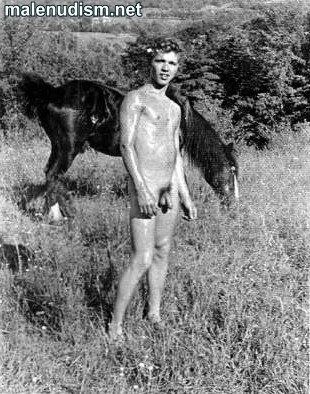 Nude Greek Boys
Nude Greek Boys Naked Athletes
Naked Athletes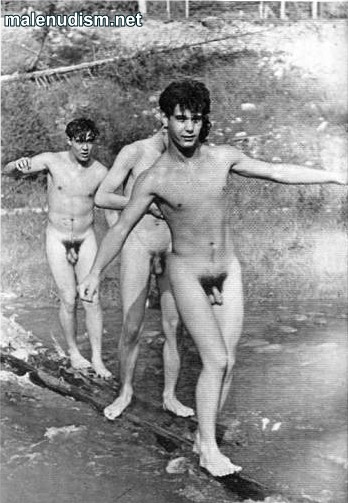 Naked Boys Dance
Naked Boys Dance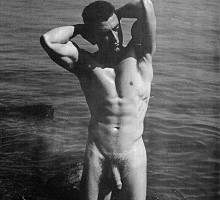 Indoor nudism
Indoor nudism Naked society
Naked society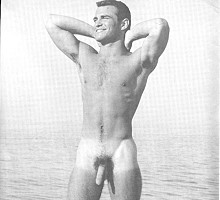 American Sunbather
American Sunbather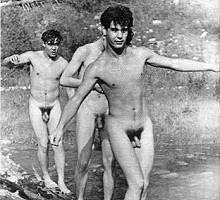 Naked men and boys history
Naked men and boys history Necessity of nudism
Necessity of nudism Male nudist' beliefs
Male nudist' beliefs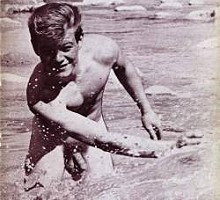 American male nudism magazine
American male nudism magazine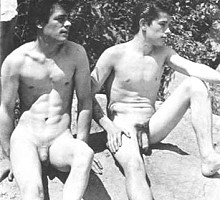 Young male nudists
Young male nudists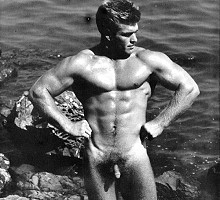 Naked bodybuilding
Naked bodybuilding Male nudism FAQ
Male nudism FAQ Male erotica
Male erotica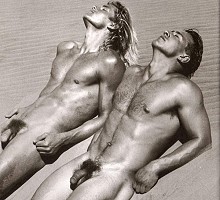 Stunning men gay erotica
Stunning men gay erotica
 Naked men and hunks
Naked men and hunks Naked guys gay voyeur
Naked guys gay voyeur Men with huge dicks and balls
Men with huge dicks and balls



